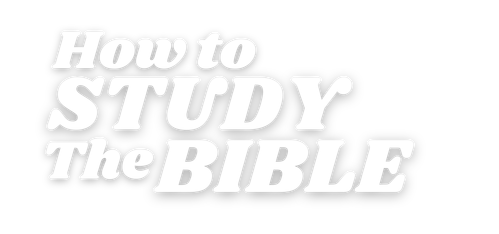

Why Study the Bible?
God has made the basic message of his Word easy to understand, but God also wants us to study the Bible to get even more out of it. Here are some principles and practices to help you take your Bible study to the next level.
It is possible to arrive at the "correct answers" in the Bible without ever learning how to study for ourselves. This is a crash course in how to study for ourselves. Don't worry, I'll walk you through it!
The 3 Things You need to study the Bible
You don't need a degree to get more out of your time with the Bible. You only need your curiosity, a sense of adventure, and a desire to know God.
Curiosity is that quality that leads us to keep digging; to keep asking questions; to keep searching. Curiosity generates the questions we need to answer: Why was it written this way? How did the author use this word in other places?
A sense of adventure is that spirit that wants to go out and answer those questions! It's one thing to wonder, it's another thing to go find out! A sense of adventure includes determination and discipline, as well as joy on the journey. William Miller, the man who first preached the second coming of Jesus in the 1830s and 1840s, famously went verse-by-verse through his Bible until he understood it.
A desire to know God our goal in Bible study. We don't study merely because we are curious or want to go on an adventure. The goal of knowing God is what makes our curiosity and adventurous spirit worth it.
One. Pray.
It seems cliche, but prayer does several things for us:
Prayer humbles the student by recognizing the master.
Prayer invites the Author to explain and apply the meaning of the text.
Prayer helps us recognize that the fruit of Bible study is not merely the result of a scientific process.
Prayer opens the heart of the reader to receive the message of the text.
1 Corinthians 2:14: "The unbeliever [lit., "natural person"] does not receive the things of the Spirit of God, for they are foolishness to him. And he cannot understand them, because they are spiritually discerned."
We are not just interested in a technical study of the Bible, but a spiritual connection with our God. We use study techniques and scientific methods, but we are not limited to them. The ultimate goal of Bible study is to know God better.
What is the Goal?
Before we go any further, let's make sure we understand the goal of Bible study: to know God better. We can best do this by accepting the Scriptures as a revelation of who he is. We strive to understand the text so we can better understand the Author.
With that said, our first order of business is to understand the meaning(s) of the text to the original audience. Our first question isn't: "What is Luke saying to me?" because *NEWSFLASH* Luke didn't know you. The Bible wasn't written to twenty-first century people. Insisting that any meaning is for us first and foremost can do some damage.
With that said, our first order of business is to understand the meaning(s) of the text to the original audience. Our first question isn't: "What is Luke saying to me?" because *NEWSFLASH* Luke didn't know you. The Bible wasn't written to twenty-first century people. Insisting that any meaning is for us first and foremost can do some damage.
Be Gay - The need to be humble interpreters
For instance, Ellen White wrote "It is natural for the young to be gay" (Youth's Instructor, May 1, 1854). If we think she was writing to us, we would have to conclude that Ellen White is saying it's natural for young people to be homosexual, because that's what the word "gay" means today. By putting ourselves first, we will completely miss her meaning. But if we try and understand that Ellen White wasn't writing to us but to a group of people in the 19th and early 20th centuries, and that the common meaning "happy", then we can understand what she meant.
Likewise with the Bible. We must first understand what the original authors meant in writing to the original audience(s) and only then we can discuss what it might mean for us.
OK, let's get going!
Likewise with the Bible. We must first understand what the original authors meant in writing to the original audience(s) and only then we can discuss what it might mean for us.
OK, let's get going!
Let's study Luke 4 as an example!
Grab your Bibles and head there.
Two. Identify the Text
Identifying the text means figuring out where the natural starting and stoping points are. Most biblical texts are part of some kind of narrative and are formed in units of thought. A Psalm is a unit of thought. So is a parable. Before we can begin studying our text, we must identify it.
How do we identify the text? It can help to outline the chapter to in order to see the different units of thought at work. For instance, here's how I would outline chapter 4:
1. Jesus is tempted in the wilderness (4:1-13)
2. Jesus begins his ministry in Galilee (4:14-30)
2A. Jesus announces his ministry in Nazareth and is rejected (4:16-30)
2B. Jesus heals in Capernaum and is accepted (4:31-44)
2B1: Jesus drives out an unclean spirit (4:31-37)
2B2: Jesus heals many (4:38-44)
The lines between sections in the Bible are usually indicated whenever the scene, time, or character changes in some way. There's no hard rule here and while the chapters and headlines in your Bible are usually correct, they're not aways correct. Let me explain...
Let's pick Luke 4:14-30 to study
Download the study guide below if you'd like to follow along
Three. Investigate the Text
After you've identified the passage, it's time to investigate! How do we do that?
1. Read the passage several times.
2. Retell the story as simply as possible - if you had to explain this passage to someone in one or two sentences, what would you say?
3. Collect questions: Look for important names, places, repeated words, or themes and write it down! Writing down as many questions as you can think of, like: "Where is this city? How far is it away? What does this word mean?"
4. Chase the answers: Once you have a list of questions, go back through the text looking for answers.
Investigation is the make-or-break phase of Bible study. You will only get out of your study what you are able to put in. The more time, the more curiosity, and the more persistence that you put in here will yield greater rewards!
As you study, you may find that you have to get over the feeling that some other author or preacher explained this better than you can. We can feel inadequate and we just want a shortcut to the "right answer." Fight those emotions! The goal isn't to get to the "right answer," it's to increase your faith.
Tips & Tricks
1. Reading: No matter how familiar the story is to you, the surest way to miss the point is to think you know how things go when you do not. Thinking we know something is a blind spot. So long as I think that I know something, I tend not to think about it! So read the text carefully -- and read it in different versions!
2. Retell the Story: Don't begin by getting distracted by the names and places; just try and tell the story as simply as possible. You want to get it clear in your own head before we complicate it by look at all of the details.
3. Collect the Evidence: This is the stage where we look for the names, places, themes, and repeated words in our text. Our goal here is to collect as many questions as we can. Don't race to grab the easy answers. Stay disciplined and ask as many questions as you can, even if you already know the answer.
4. Chase the Answers: Finally! All of our focus pays off as we begin to seek answers to these questions. Go down your list and try and put it all together.
What about Commentaries?
Commentaries can be really helpful.
Or really unhelpful.
Let me explain in this video.
Or really unhelpful.
Let me explain in this video.
Four. Explore the Contexts
After we've studied our home text carefully, it's time to leave home and see how it fits into the broader biblical world. We move from Investigating the Text to Exploring the Contexts. In the exploring phase, we focus on the texts surrounding our text in order to better understand our text.
Context is a vital part of communication. Let's imagine that we discovered a new document by the Protestant Reformer, Martin Luther. On it was a single word: "No." We all know what the word "no" means, right? In this case, we can say that we understand the text we are studying.
But the question is: how fully do we understand the text?
What if we studied the external context of the text and discovered that it was written in July 1523. Now we are understanding his "no" a little better.
What if we dug deeper and learned that this new document was Luther's reply to someone who had recommended he get married. Ah! Now we know a lot more about his "no," especially in light of the fact that he did marry Katharina von Bora months later!
This is my point: You can understand the word "no" by itself. But you will never fully understand what you are studying unless you know the context.
In some cases, not knowing the context can actually mislead you.
"Unless we can grasp the whole before attempting to dissect the parts, interpretation is doomed from the start. Statements simply have no meaning apart from their context."
- Grant Osborne, The Hermeneutical Spiral, 19.
- Grant Osborne, The Hermeneutical Spiral, 19.
Internal Contexts
What we want to avoid "proof-texting" at all costs. "Proof-texting" is when we pluck one verse out of its context. For example, the Bible says "throw yourself down from here" (Luke 4:9). Does that mean we should all jump down from where we are? No. If we read the context we will see that the one telling us to jump is the devil!
We must study the internal context surrounding our passage, as the graphic to our left illustrates. We begin with our text, then we slowly work out way to the outside of the circle.
What does our text mean?
What does our text mean in light of the passages around it?
What does our text mean in light of the book it is in?
What does our text mean in light of the author who wrote it?
What does our text mean in light of the testament it is in?
What does our text mean in light of the entire Bible?
Each step we take toward the outside of the circle helps us understand our text. Check out the video above to learn more.
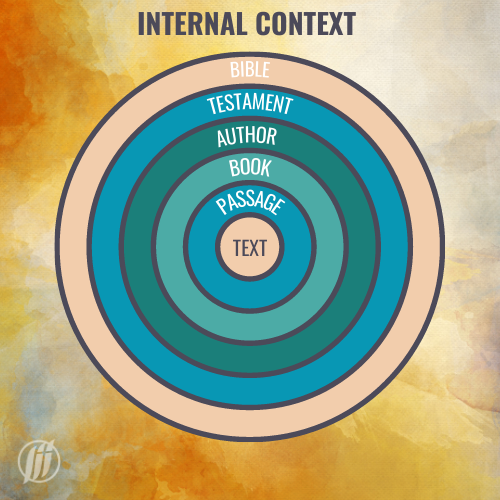
External Contexts
Understanding the external contexts of our text are often more challenging than internal contexts, but they are no less important.
LITERARY: The genre of the text shapes its meaning. We don't interpret prophecies the same way we interpret proverbs. Also, what themes
CULTURAL: The more we understand the culture of people in the ancient near east, the better we will understand them.
RELIGIOUS: We can learn about our text by comparing, say, a law of Moses to the religious laws of Canaanite neighbors. Or by comparing Jesus' teaching with that of the Pharisees.
GEOGRAPHICAL: Maps and archaeological finds can help us better understand the world of the Bible.
HISTORICAL: Historical records can help us understand more about the people and places of the Bible. The Bible can tell us something happened in the 4th year of King so-and-so, but we wouldn't know when that was without historical sources. The historical context can also help us know when books were written and thus what might have been going on in the world around the author.
What About OUR Context?
WE are not free from context. We all read the Bible through various lenses. We can't help it. These lenses often lead us to notice some verses over others; to understand the meaning of a text or the skew it.
We read the Bible with biased eyes. We are not blank slates. This is why we need to gather together with other Christians who see things differently. We must accept that my own experiences and culture and history limits my perspective. I NEED your perspective to better understand the Bible - to see past my own biases.
PERSONAL: Our life experiences shape the way we read the Bible. So do our gender, class, and personal beliefs.
CONFESSIONAL: Our values and presuppositions and beliefs shape how we read the Bible. If we are Adventist, we tend to read the Bible with Adventist eyes, interpreting certain texts certain ways.
CULTURAL: Our culture also shapes how we interpret the Bible. We tend to interpret the Bible in line with our culture. Americans might value texts about freedom in Christ; other cultures might value obedience more.
GEOGRAPHICAL: If you grew up in an area with persistent drought, you are more likely to understand those Bible characters who also wrestled with hunger.
HISTORICAL: As an American, I am shaped by my own American history as I read the Bible.
We read the Bible with biased eyes. We are not blank slates. This is why we need to gather together with other Christians who see things differently. We must accept that my own experiences and culture and history limits my perspective. I NEED your perspective to better understand the Bible - to see past my own biases.
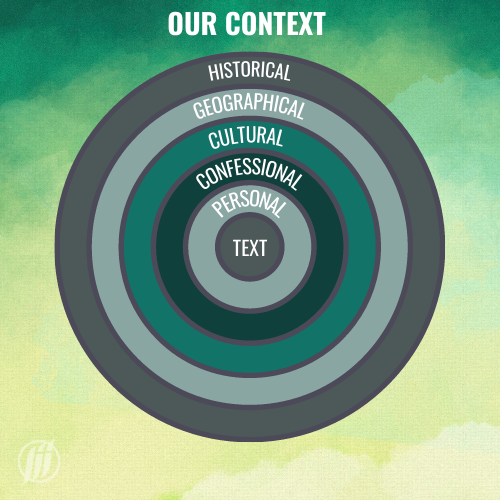
Five. Apply the Text
What is good is what you studied if doesn't challenge you to change?
We don't study a nursing school textbook so we can be masters of the textbook. We study so that we can pass our class and, ultimately, help sick people become well.
Likewise, we don't study the Bible just to know the Bible better, but to know God better. Knowing God is not just knowing things about him, but understanding who he is and living in a way that honors him.
To do that, we need to take the results of our Bible study and put it to use.
When we are done investigating the text and exploring the contexts, we ask ourselves a vital question: So what?
We don't study a nursing school textbook so we can be masters of the textbook. We study so that we can pass our class and, ultimately, help sick people become well.
Likewise, we don't study the Bible just to know the Bible better, but to know God better. Knowing God is not just knowing things about him, but understanding who he is and living in a way that honors him.
To do that, we need to take the results of our Bible study and put it to use.
When we are done investigating the text and exploring the contexts, we ask ourselves a vital question: So what?
Mis-applications
As with all things, we can miss the point by misapplying the Word and do great damage to ourselves.
In particular, we have to be careful not to over-extend an application of a text by making it apply to something it was never meant to apply to. The application should be something the author of the text would agree is in harmony with his or her point in the text.
Always make the application of Scripture a matter of prayer. Thus, we begin and end every study of the Bible with prayer.
In particular, we have to be careful not to over-extend an application of a text by making it apply to something it was never meant to apply to. The application should be something the author of the text would agree is in harmony with his or her point in the text.
Always make the application of Scripture a matter of prayer. Thus, we begin and end every study of the Bible with prayer.
IT'S YOUR TURN
Go study the Bible using the tools you now have!
RESOURCES
If you want to go deeper into Bible study, Pastor Matthew recommends the following resources:
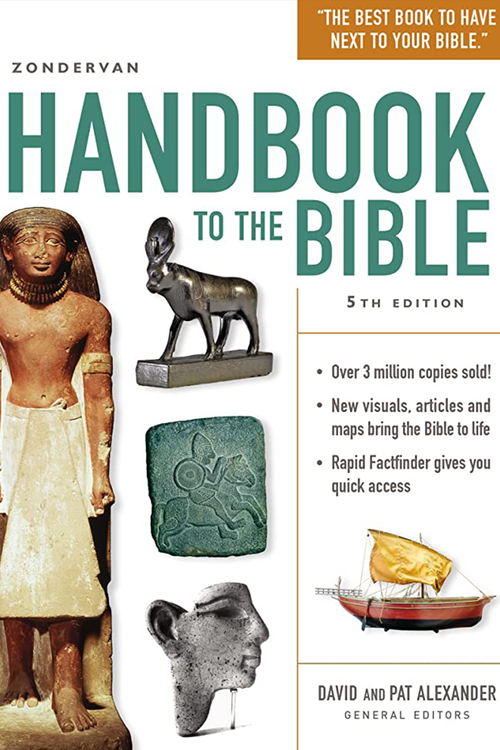
Zondervan Handbook
to the Bible
This is an invaluable resource that explains the background of much of the Bible.
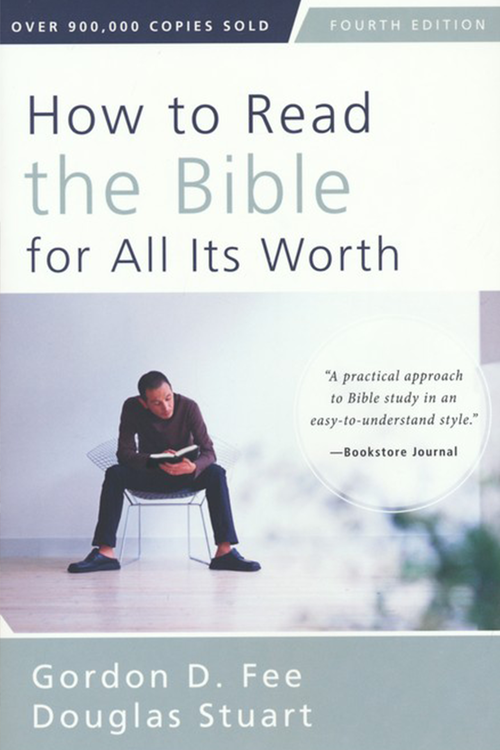
How to Study the Bible For All It's Worth
(Gordon D. Fee)
Easy to read, this book has become the standard introductory book to help people get the most out of their Bible study.
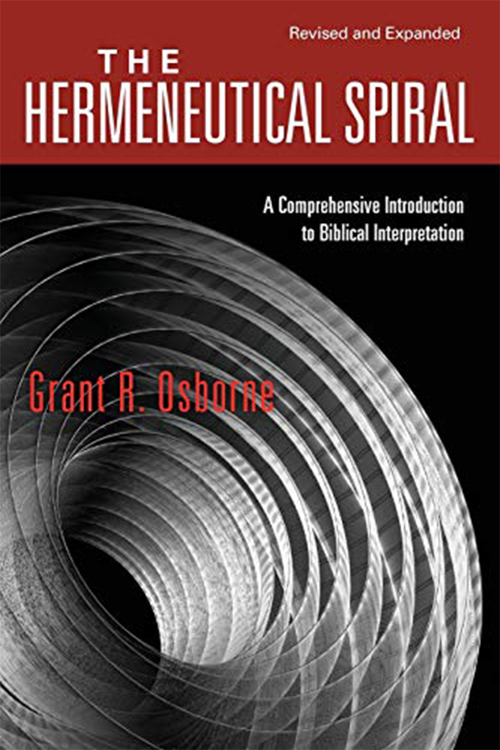
The Hermeneutical Spiral (Grant Osborne)
This college textbook explores every nook of interpreting the Bible. This is for the more theologically minded members who are comfortable with words like "hermeneutical."
